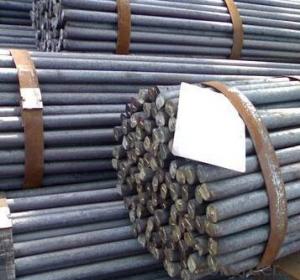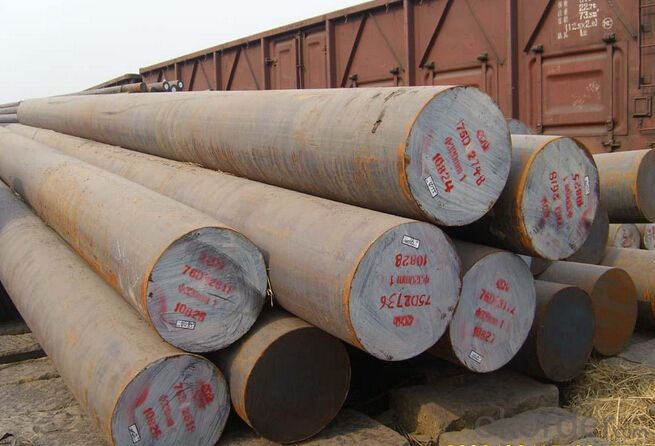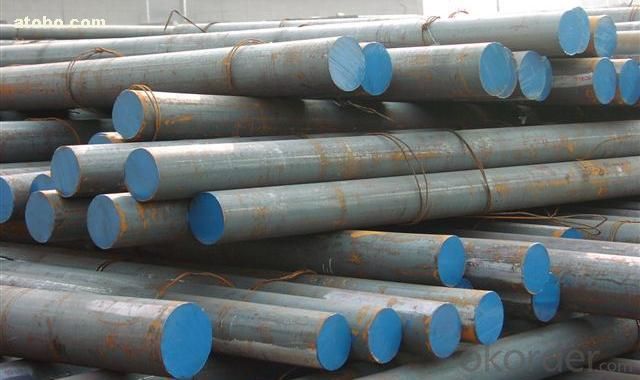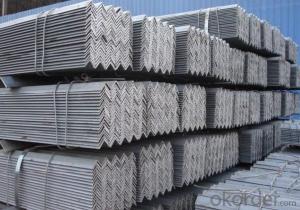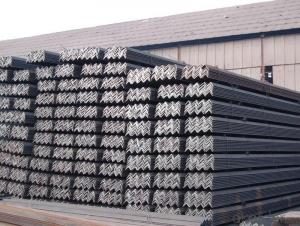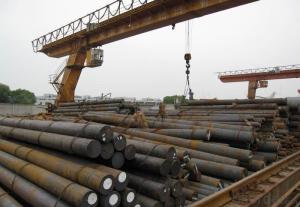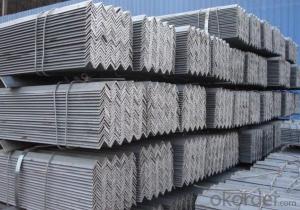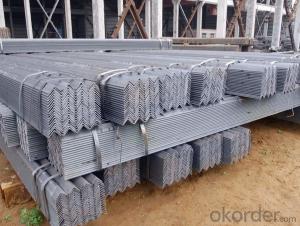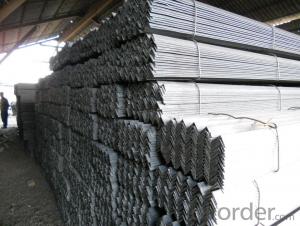ASTM A36 Steel Equivalent Q235 Carbon Steel
- Loading Port:
- China main port
- Payment Terms:
- TT or LC
- Min Order Qty:
- 30 m.t.
- Supply Capability:
- 10000 m.t./month
OKorder Service Pledge
OKorder Financial Service
You Might Also Like
Specification
ASTM A36 Steel Equivalent Q235 Carbon Steel
Product Information:
1.DIA:10mm-300mm
Length:4-12M
Quality:L.F+V.D etc
2. Chemical Elements
| Grade | C | Si | Mn | P | S | Cr | Ni | B |
| 1020 | 0.17-0.23 | 0.17-0.37 | 0.35-0.65 | Max 0.030 | Max 0.030 | Max 0.25 | Max 0.30 | 0.0008-0.0030 |
| 1045 | 0.42-0.50 | 0.17-0.37 | 0.50-0.80 | Max 0.030 | Max 0.030 | Max 0.25 | Max 0.30 | 0.0008-0.0030 |
3. Grade: ASTM A36 Q235
Hardness:156HB
Tensile strength:410MPA
Yield strength: 245MPA
elogation:25% Reduction of area:55% AKV(impact value):54J
Product Overviews:
| Product Name | Typical Grades | Diameter(mm) | Standard adopted |
| Carbon Steel | 20 (1020/S20C/C22) | Ø16-Ø300 | GB/SAE/JIS/DIN |
| 40 (1040/S40C/C40) | |||
| 45 (1045/S45C/C45) | |||
| Bearing Steel | GCr9 (51100/SUJ1) | Ø12-Ø250 | |
| GCr15 (52100/SUJ2/100Gr6) | |||
| GCr9SiMn (A485-Gr.1/SUJ3) | |||
| Cr-Mo Steel | 20Cr (5120/SCr420H/20Cr4) | Ø12-Ø250 | |
| 40Cr (5140/SCr440/41Cr4) | |||
| 42CrMo(4140/SCM440/42CrMo4) | |||
| Gear Steel | 20CrNiMo | Ø16-Ø600 | |
| 20CrMn(5115/SMnC420/20MnCr5) | |||
| 20CrNiMo(8620/SNCM220/20CrMiMo2) |
Product Show:

Our Advantages:
· Industry experience over 20 years.
· Shipment of goods -More than 70 countries worldwide.
· The most convenient transport and prompt delivery.
· Competitive price with best service.
· High technical production line with top quality products.
· High reputation based on best quality products.
With our experienced, enthusiastic and dynamic staffs, we assure to bring you the products with best quality, reasonable prices and good after-sales services under the motto: Friends First, Business After.
Communication, Experience, Expertise and Best efforts are our Promises to you.
Special steel and there is no uniform definition of the concept of special steel is generally considered to have a special chemical composition (alloying), using a special production process, with a special organization and performance to meet the special needs of the steel type. Compared with ordinary steel, special steel has a higher strength and toughness, physical properties, chemical properties, biocompatibility and process performance.
China and Japan, the EU definition of special steel closer, into the special steel quality carbon steel, alloy steel, high alloy steel (alloying elements greater than 10%) three categories, including steel and high-alloy special steel production accounted for 70%. The main advantages of special steel carbon structural steel, carbon tool steel, carbon spring steel, alloy spring steel, alloy steel, ball bearing steel, alloy tool steel, high alloy tool steel, high speed tool steel, stainless steel, heat-resistant steel , and high-temperature alloys, precision alloy, electric alloy. There are nearly 2,000 special steel grades, about 50,000 varieties and specifications in the world currently. In addition to a wide range of special steel outside, in the specification with ordinary steel also showed different characteristics. In addition to plates, tubes, wire, strip, rods and profiles outside, as well as composite materials, surface alloying material, surface treatment material, forging materials, precision casting, powder metallurgy products.
- Q: Can special steel be used for making automotive engine components?
- Yes, special steel can be used for making automotive engine components. This type of steel offers enhanced strength, durability, and heat resistance, making it suitable for critical engine parts such as crankshafts, connecting rods, valves, and camshafts. Special steel helps improve engine performance, efficiency, and longevity, making it a preferred choice in the automotive industry.
- Q: What are the challenges in machining special steel with complex geometries?
- Some of the challenges in machining special steel with complex geometries include the difficulty in maintaining dimensional accuracy due to the intricate shapes, the potential for tool wear and breakage due to the high hardness and toughness of the steel, and the need for specialized cutting tools and techniques to effectively shape the intricate geometries. Additionally, the heat generated during machining can affect the material properties of the steel, leading to potential distortions or residual stresses in the final product.
- Q: How does special steel perform in terms of chemical resistance?
- Special steel generally performs well in terms of chemical resistance. It is often designed to have high resistance to corrosion, oxidation, and chemical reactions with various substances. This attribute makes it suitable for applications in industries like oil and gas, chemical processing, and marine environments. However, the specific chemical resistance of special steel can vary depending on its composition and treatment, so it is important to consider the specific requirements and consult with experts when selecting the appropriate type of special steel for a particular application.
- Q: How is special steel used in the aerospace manufacturing process?
- Special steel is used in the aerospace manufacturing process for various applications, such as producing critical components like landing gear, turbine blades, and engine parts. The high strength, durability, and resistance to corrosion make special steel an ideal material for these aerospace components, ensuring the safety, reliability, and performance of the aircraft.
- Q: Can special steel be used in the production of springs for automotive suspension?
- Yes, special steel can be used in the production of springs for automotive suspension. Special steel, such as high-strength or alloy steel, is often preferred for its improved durability, strength, and resistance to fatigue. These properties are critical for springs in automotive suspension systems, as they need to withstand the constant stress and load of the vehicle's weight and provide a smooth ride.
- Q: How does special steel resist thermal fatigue?
- Special steel is able to resist thermal fatigue due to its unique composition and properties. Thermal fatigue occurs when a material is subjected to repeated heating and cooling cycles, leading to the formation of cracks and eventual failure of the material. Special steel is specifically designed to withstand extreme temperature changes. It has a high melting point and excellent thermal conductivity, which allows it to efficiently dissipate heat and minimize thermal stress. Additionally, the steel is often alloyed with elements such as chromium, nickel, and molybdenum, which enhance its resistance to thermal fatigue. The alloying elements in special steel form a protective layer that acts as a barrier against oxidation and corrosion. This protective layer prevents the formation of cracks and improves the steel's ability to withstand thermal cycling. Furthermore, the alloying elements improve the steel's structural integrity by promoting the formation of fine and evenly dispersed microstructures. This enhances the steel's toughness and resistance to cracking. Moreover, special steel undergoes various heat treatment processes to further enhance its resistance to thermal fatigue. These processes involve controlled heating and cooling cycles, which refine the microstructure of the steel and make it more resistant to deformation and cracking. The heat treatment also helps in relieving any residual stresses that may have been induced during the manufacturing process. In summary, special steel resists thermal fatigue through its unique composition, alloying elements, and heat treatment processes. Its high melting point, excellent thermal conductivity, and protective layer against oxidation and corrosion make it highly resistant to thermal cycling. The refined microstructure and relieved residual stresses further enhance its ability to withstand repeated heating and cooling cycles without failure.
- Q: How does special steel contribute to improved product aesthetics?
- Special steel contributes to improved product aesthetics in several ways. Firstly, special steel can be manufactured with a higher level of precision and consistency compared to regular steel. This allows for the creation of products with smoother surfaces, sharper edges, and more intricate designs. As a result, products made from special steel often have a more visually appealing appearance. Additionally, special steel can be treated or coated to enhance its visual appeal. For example, it can be polished to create a reflective surface, giving the product a high-end and luxurious look. Special steel can also be coated with different colors or finishes, such as chrome or black oxide, to match specific design preferences and create a more visually striking appearance. Furthermore, special steel can be shaped and formed in unique ways due to its superior strength and flexibility. This allows designers to create products with more complex and innovative shapes, resulting in a distinct and eye-catching aesthetic. The ability to mold special steel into various forms also opens up possibilities for creating intricate patterns, textures, and embossed designs on the product's surface. Lastly, special steel offers excellent corrosion resistance and durability, which helps maintain the product's appearance over time. It prevents rust, staining, and other forms of deterioration that can negatively impact the visual appeal of a product. This long-lasting aesthetic quality is especially important for products that are regularly exposed to harsh environments or require frequent handling. In summary, special steel contributes to improved product aesthetics through its precision manufacturing, customizable surface treatments, unique shaping capabilities, and long-lasting visual appeal. These qualities allow for the creation of visually appealing products that stand out in terms of design, finish, and overall appeal.
- Q: How does special steel contribute to improving product performance in corrosive environments?
- Special steel contributes to improving product performance in corrosive environments due to its unique properties and composition. Special steel is specifically designed to resist corrosion and maintain its structural integrity even when exposed to harsh conditions. It contains elements like chromium, nickel, and molybdenum that form a protective layer on the surface, preventing the metal from reacting with corrosive substances. This enhanced corrosion resistance ensures that products made from special steel have a longer lifespan, reduced maintenance requirements, and improved performance in corrosive environments.
- Q: What are the different methods for nitriding special steel?
- There are several methods for nitriding special steel, including gas nitriding, salt bath nitriding, plasma nitriding, and ion nitriding.
- Q: What are the applications of high-strength low-alloy (HSLA) steel?
- High-strength low-alloy (HSLA) steel finds applications in various industries such as automotive, construction, and manufacturing. It is commonly used in the production of lightweight and durable vehicle components, structural beams, pipelines, and machinery parts. HSLA steel's enhanced strength and toughness make it ideal for applications where weight reduction, increased load-bearing capacity, and resistance to corrosion and impact are crucial.
Send your message to us
ASTM A36 Steel Equivalent Q235 Carbon Steel
- Loading Port:
- China main port
- Payment Terms:
- TT or LC
- Min Order Qty:
- 30 m.t.
- Supply Capability:
- 10000 m.t./month
OKorder Service Pledge
OKorder Financial Service
Similar products
Hot products
Hot Searches
Related keywords
